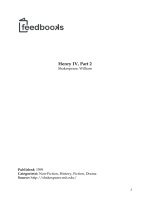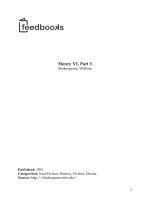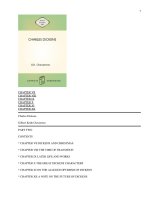Henry VI, Part 2 pot
Bạn đang xem bản rút gọn của tài liệu. Xem và tải ngay bản đầy đủ của tài liệu tại đây (263.89 KB, 160 trang )
Henry VI, Part 2
Shakespeare, William
Published: 1591
Categorie(s): Non-Fiction, History, Fiction, Drama
Source: />1
About Shakespeare:
William Shakespeare (baptised 26 April 1564 – died 23 April 1616) was
an English poet and playwright, widely regarded as the greatest writer
in the English language and the world's pre-eminent dramatist. He is of-
ten called England's national poet and the "Bard of Avon" (or simply
"The Bard"). His surviving works consist of 38 plays, 154 sonnets, two
long narrative poems, and several other poems. His plays have been
translated into every major living language, and are performed more of-
ten than those of any other playwright. Shakespeare was born and raised
in Stratford-upon-Avon. At the age of 18 he married Anne Hathaway,
who bore him three children: Susanna, and twins Hamnet and Judith.
Between 1585 and 1592 he began a successful career in London as an act-
or, writer, and part owner of the playing company the Lord
Chamberlain's Men, later known as the King's Men. He appears to have
retired to Stratford around 1613, where he died three years later. Few re-
cords of Shakespeare's private life survive, and there has been consider-
able speculation about such matters as his sexuality, religious beliefs,
and whether the works attributed to him were written by others.
Shakespeare produced most of his known work between 1590 and 1613.
His early plays were mainly comedies and histories, genres he raised to
the peak of sophistication and artistry by the end of the sixteenth cen-
tury. Next he wrote mainly tragedies until about 1608, including Hamlet,
King Lear, and Macbeth, considered some of the finest examples in the
English language. In his last phase, he wrote tragicomedies, also known
as romances, and collaborated with other playwrights. Many of his plays
were published in editions of varying quality and accuracy during his
lifetime, and in 1623 two of his former theatrical colleagues published
the First Folio, a collected edition of his dramatic works that included all
but two of the plays now recognised as Shakespeare's. Shakespeare was
a respected poet and playwright in his own day, but his reputation did
not rise to its present heights until the nineteenth century. The Ro-
mantics, in particular, acclaimed Shakespeare's genius, and the
Victorians hero-worshipped Shakespeare with a reverence that George
Bernard Shaw called "bardolatry". In the twentieth century, his work was
repeatedly adopted and rediscovered by new movements in scholarship
and performance. His plays remain highly popular today and are con-
sistently performed and reinterpreted in diverse cultural and political
contexts throughout the world. Source: Wikipedia
Also available on Feedbooks for Shakespeare:
2
• Romeo and Juliet (1597)
• Hamlet (1599)
• Macbeth (1606)
• A Midsummer Night's Dream (1596)
• Julius Caesar (1599)
• Othello (1603)
• The Merchant of Venice (1598)
• Much Ado About Nothing (1600)
• King Lear (1606)
• The Taming of the Shrew (1594)
Note: This book is brought to you by Feedbooks
Strictly for personal use, do not use this file for commercial purposes.
3
Act I
SCENE I. London. The palace.
Flourish of trumpets: then hautboys. Enter KING HENRY VI,
GLOUCESTER, SALISBURY, WARWICK, and CARDINAL, on the
one side; QUEEN MARGARET, SUFFOLK, YORK, SOMERSET,
and BUCKINGHAM, on the other
SUFFOLK
As by your high imperial majesty
I had in charge at my depart for France,
As procurator to your excellence,
To marry Princess Margaret for your grace,
So, in the famous ancient city, Tours,
In presence of the Kings of France and Sicil,
The Dukes of Orleans, Calaber, Bretagne and Alencon,
Seven earls, twelve barons and twenty reverend bishops,
I have perform'd my task and was espoused:
And humbly now upon my bended knee,
In sight of England and her lordly peers,
Deliver up my title in the queen
To your most gracious hands, that are the substance
Of that great shadow I did represent;
The happiest gift that ever marquess gave,
The fairest queen that ever king received.
KING HENRY VI
Suffolk, arise. Welcome, Queen Margaret:
I can express no kinder sign of love
Than this kind kiss. O Lord, that lends me life,
Lend me a heart replete with thankfulness!
For thou hast given me in this beauteous face
A world of earthly blessings to my soul,
If sympathy of love unite our thoughts.
QUEEN MARGARET
4
Great King of England and my gracious lord,
The mutual conference that my mind hath had,
By day, by night, waking and in my dreams,
In courtly company or at my beads,
With you, mine alder-liefest sovereign,
Makes me the bolder to salute my king
With ruder terms, such as my wit affords
And over-joy of heart doth minister.
KING HENRY VI
Her sight did ravish; but her grace in speech,
Her words y-clad with wisdom's majesty,
Makes me from wondering fall to weeping joys;
Such is the fulness of my heart's content.
Lords, with one cheerful voice welcome my love.
ALL
[Kneeling] Long live Queen Margaret, England's
happiness!
QUEEN MARGARET
We thank you all.
Flourish
SUFFOLK
My lord protector, so it please your grace,
Here are the articles of contracted peace
Between our sovereign and the French king Charles,
For eighteen months concluded by consent.
GLOUCESTER
[Reads] 'Imprimis, it is agreed between the French
king Charles, and William de la Pole, Marquess of
Suffolk, ambassador for Henry King of England, that
the said Henry shall espouse the Lady Margaret,
daughter unto Reignier King of Naples, Sicilia and
5
Jerusalem, and crown her Queen of England ere the
thirtieth of May next ensuing. Item, that the duchy
of Anjou and the county of Maine shall be released
and delivered to the king her father'—
Lets the paper fall
KING HENRY VI
Uncle, how now!
GLOUCESTER
Pardon me, gracious lord;
Some sudden qualm hath struck me at the heart
And dimm'd mine eyes, that I can read no further.
KING HENRY VI
Uncle of Winchester, I pray, read on.
CARDINAL
[Reads] 'Item, It is further agreed between them,
that the duchies of Anjou and Maine shall be
released and delivered over to the king her father,
and she sent over of the King of England's own
proper cost and charges, without having any dowry.'
KING HENRY VI
They please us well. Lord marquess, kneel down:
We here create thee the first duke of Suffolk,
And gird thee with the sword. Cousin of York,
We here discharge your grace from being regent
I' the parts of France, till term of eighteen months
Be full expired. Thanks, uncle Winchester,
Gloucester, York, Buckingham, Somerset,
Salisbury, and Warwick;
We thank you all for the great favour done,
In entertainment to my princely queen.
6
Come, let us in, and with all speed provide
To see her coronation be perform'd.
Exeunt KING HENRY VI, QUEEN MARGARET, and SUFFOLK
GLOUCESTER
Brave peers of England, pillars of the state,
To you Duke Humphrey must unload his grief,
Your grief, the common grief of all the land.
What! did my brother Henry spend his youth,
His valour, coin and people, in the wars?
Did he so often lodge in open field,
In winter's cold and summer's parching heat,
To conquer France, his true inheritance?
And did my brother Bedford toil his wits,
To keep by policy what Henry got?
Have you yourselves, Somerset, Buckingham,
Brave York, Salisbury, and victorious Warwick,
Received deep scars in France and Normandy?
Or hath mine uncle Beaufort and myself,
With all the learned council of the realm,
Studied so long, sat in the council-house
Early and late, debating to and fro
How France and Frenchmen might be kept in awe,
And had his highness in his infancy
Crowned in Paris in despite of foes?
And shall these labours and these honours die?
Shall Henry's conquest, Bedford's vigilance,
Your deeds of war and all our counsel die?
O peers of England, shameful is this league!
Fatal this marriage, cancelling your fame,
Blotting your names from books of memory,
Razing the characters of your renown,
Defacing monuments of conquer'd France,
Undoing all, as all had never been!
CARDINAL
Nephew, what means this passionate discourse,
This peroration with such circumstance?
For France, 'tis ours; and we will keep it still.
7
GLOUCESTER
Ay, uncle, we will keep it, if we can;
But now it is impossible we should:
Suffolk, the new-made duke that rules the roast,
Hath given the duchy of Anjou and Maine
Unto the poor King Reignier, whose large style
Agrees not with the leanness of his purse.
SALISBURY
Now, by the death of Him that died for all,
These counties were the keys of Normandy.
But wherefore weeps Warwick, my valiant son?
WARWICK
For grief that they are past recovery:
For, were there hope to conquer them again,
My sword should shed hot blood, mine eyes no tears.
Anjou and Maine! myself did win them both;
Those provinces these arms of mine did conquer:
And are the cities, that I got with wounds,
Delivered up again with peaceful words?
Mort Dieu!
YORK
For Suffolk's duke, may he be suffocate,
That dims the honour of this warlike isle!
France should have torn and rent my very heart,
Before I would have yielded to this league.
I never read but England's kings have had
Large sums of gold and dowries with their wives:
And our King Henry gives away his own,
To match with her that brings no vantages.
GLOUCESTER
A proper jest, and never heard before,
That Suffolk should demand a whole fifteenth
8
For costs and charges in transporting her!
She should have stayed in France and starved
in France, Before—
CARDINAL
My Lord of Gloucester, now ye grow too hot:
It was the pleasure of my lord the King.
GLOUCESTER
My Lord of Winchester, I know your mind;
'Tis not my speeches that you do mislike,
But 'tis my presence that doth trouble ye.
Rancour will out: proud prelate, in thy face
I see thy fury: if I longer stay,
We shall begin our ancient bickerings.
Lordings, farewell; and say, when I am gone,
I prophesied France will be lost ere long.
Exit
CARDINAL
So, there goes our protector in a rage.
'Tis known to you he is mine enemy,
Nay, more, an enemy unto you all,
And no great friend, I fear me, to the king.
Consider, lords, he is the next of blood,
And heir apparent to the English crown:
Had Henry got an empire by his marriage,
And all the wealthy kingdoms of the west,
There's reason he should be displeased at it.
Look to it, lords! let not his smoothing words
Bewitch your hearts; be wise and circumspect.
What though the common people favour him,
Calling him 'Humphrey, the good Duke of
Gloucester,'
Clapping their hands, and crying with loud voice,
'Jesu maintain your royal excellence!'
With 'God preserve the good Duke Humphrey!'
9
I fear me, lords, for all this flattering gloss,
He will be found a dangerous protector.
BUCKINGHAM
Why should he, then, protect our sovereign,
He being of age to govern of himself?
Cousin of Somerset, join you with me,
And all together, with the Duke of Suffolk,
We'll quickly hoise Duke Humphrey from his seat.
CARDINAL
This weighty business will not brook delay:
I'll to the Duke of Suffolk presently.
Exit
SOMERSET
Cousin of Buckingham, though Humphrey's pride
And greatness of his place be grief to us,
Yet let us watch the haughty cardinal:
His insolence is more intolerable
Than all the princes in the land beside:
If Gloucester be displaced, he'll be protector.
BUCKINGHAM
Or thou or I, Somerset, will be protector,
Despite Duke Humphrey or the cardinal.
Exeunt BUCKINGHAM and SOMERSET
SALISBURY
Pride went before, ambition follows him.
While these do labour for their own preferment,
Behoves it us to labour for the realm.
I never saw but Humphrey Duke of Gloucester
Did bear him like a noble gentleman.
Oft have I seen the haughty cardinal,
More like a soldier than a man o' the church,
10
As stout and proud as he were lord of all,
Swear like a ruffian and demean himself
Unlike the ruler of a commonweal.
Warwick, my son, the comfort of my age,
Thy deeds, thy plainness and thy housekeeping,
Hath won the greatest favour of the commons,
Excepting none but good Duke Humphrey:
And, brother York, thy acts in Ireland,
In bringing them to civil discipline,
Thy late exploits done in the heart of France,
When thou wert regent for our sovereign,
Have made thee fear'd and honour'd of the people:
Join we together, for the public good,
In what we can, to bridle and suppress
The pride of Suffolk and the cardinal,
With Somerset's and Buckingham's ambition;
And, as we may, cherish Duke Humphrey's deeds,
While they do tend the profit of the land.
WARWICK
So God help Warwick, as he loves the land,
And common profit of his country!
YORK
[Aside] And so says York, for he hath greatest cause.
SALISBURY
Then let's make haste away, and look unto the main.
WARWICK
Unto the main! O father, Maine is lost;
That Maine which by main force Warwick did win,
And would have kept so long as breath did last!
Main chance, father, you meant; but I meant Maine,
Which I will win from France, or else be slain,
Exeunt WARWICK and SALISBURY
11
YORK
Anjou and Maine are given to the French;
Paris is lost; the state of Normandy
Stands on a tickle point, now they are gone:
Suffolk concluded on the articles,
The peers agreed, and Henry was well pleased
To change two dukedoms for a duke's fair daughter.
I cannot blame them all: what is't to them?
'Tis thine they give away, and not their own.
Pirates may make cheap pennyworths of their pillage
And purchase friends and give to courtezans,
Still revelling like lords till all be gone;
While as the silly owner of the goods
Weeps over them and wrings his hapless hands
And shakes his head and trembling stands aloof,
While all is shared and all is borne away,
Ready to starve and dare not touch his own:
So York must sit and fret and bite his tongue,
While his own lands are bargain'd for and sold.
Methinks the realms of England, France and Ireland
Bear that proportion to my flesh and blood
As did the fatal brand Althaea burn'd
Unto the prince's heart of Calydon.
Anjou and Maine both given unto the French!
Cold news for me, for I had hope of France,
Even as I have of fertile England's soil.
A day will come when York shall claim his own;
And therefore I will take the Nevils' parts
And make a show of love to proud Duke Humphrey,
And, when I spy advantage, claim the crown,
For that's the golden mark I seek to hit:
Nor shall proud Lancaster usurp my right,
Nor hold the sceptre in his childish fist,
Nor wear the diadem upon his head,
Whose church-like humours fits not for a crown.
Then, York, be still awhile, till time do serve:
Watch thou and wake when others be asleep,
To pry into the secrets of the state;
Till Henry, surfeiting in joys of love,
12
With his new bride and England's dear-bought queen,
And Humphrey with the peers be fall'n at jars:
Then will I raise aloft the milk-white rose,
With whose sweet smell the air shall be perfumed;
And in my standard bear the arms of York
To grapple with the house of Lancaster;
And, force perforce, I'll make him yield the crown,
Whose bookish rule hath pull'd fair England down.
Exit
13
SCENE II. GLOUCESTER'S house.
Enter GLOUCESTER and his DUCHESS
DUCHESS
Why droops my lord, like over-ripen'd corn,
Hanging the head at Ceres' plenteous load?
Why doth the great Duke Humphrey knit his brows,
As frowning at the favours of the world?
Why are thine eyes fixed to the sullen earth,
Gazing on that which seems to dim thy sight?
What seest thou there? King Henry's diadem,
Enchased with all the honours of the world?
If so, gaze on, and grovel on thy face,
Until thy head be circled with the same.
Put forth thy hand, reach at the glorious gold.
What, is't too short? I'll lengthen it with mine:
And, having both together heaved it up,
We'll both together lift our heads to heaven,
And never more abase our sight so low
As to vouchsafe one glance unto the ground.
GLOUCESTER
O Nell, sweet Nell, if thou dost love thy lord,
Banish the canker of ambitious thoughts.
And may that thought, when I imagine ill
Against my king and nephew, virtuous Henry,
Be my last breathing in this mortal world!
My troublous dream this night doth make me sad.
DUCHESS
What dream'd my lord? tell me, and I'll requite it
With sweet rehearsal of my morning's dream.
GLOUCESTER
Methought this staff, mine office-badge in court,
Was broke in twain; by whom I have forgot,
14
But, as I think, it was by the cardinal;
And on the pieces of the broken wand
Were placed the heads of Edmund Duke of Somerset,
And William de la Pole, first duke of Suffolk.
This was my dream: what it doth bode, God knows.
DUCHESS
Tut, this was nothing but an argument
That he that breaks a stick of Gloucester's grove
Shall lose his head for his presumption.
But list to me, my Humphrey, my sweet duke:
Methought I sat in seat of majesty
In the cathedral church of Westminster,
And in that chair where kings and queens are crown'd;
Where Henry and dame Margaret kneel'd to me
And on my head did set the diadem.
GLOUCESTER
Nay, Eleanor, then must I chide outright:
Presumptuous dame, ill-nurtured Eleanor,
Art thou not second woman in the realm,
And the protector's wife, beloved of him?
Hast thou not worldly pleasure at command,
Above the reach or compass of thy thought?
And wilt thou still be hammering treachery,
To tumble down thy husband and thyself
From top of honour to disgrace's feet?
Away from me, and let me hear no more!
DUCHESS
What, what, my lord! are you so choleric
With Eleanor, for telling but her dream?
Next time I'll keep my dreams unto myself,
And not be cheque'd.
GLOUCESTER
Nay, be not angry; I am pleased again.
15
Enter Messenger
Messenger
My lord protector, 'tis his highness' pleasure
You do prepare to ride unto Saint Alban's,
Where as the king and queen do mean to hawk.
GLOUCESTER
I go. Come, Nell, thou wilt ride with us?
DUCHESS
Yes, my good lord, I'll follow presently.
Exeunt GLOUCESTER and Messenger
Follow I must; I cannot go before,
While Gloucester bears this base and humble mind.
Were I a man, a duke, and next of blood,
I would remove these tedious stumbling-blocks
And smooth my way upon their headless necks;
And, being a woman, I will not be slack
To play my part in Fortune's pageant.
Where are you there? Sir John! nay, fear not, man,
We are alone; here's none but thee and I.
Enter HUME
HUME
Jesus preserve your royal majesty!
DUCHESS
What say'st thou? majesty! I am but grace.
HUME
But, by the grace of God, and Hume's advice,
Your grace's title shall be multiplied.
DUCHESS
16
What say'st thou, man? hast thou as yet conferr'd
With Margery Jourdain, the cunning witch,
With Roger Bolingbroke, the conjurer?
And will they undertake to do me good?
HUME
This they have promised, to show your highness
A spirit raised from depth of under-ground,
That shall make answer to such questions
As by your grace shall be propounded him.
DUCHESS
It is enough; I'll think upon the questions:
When from St. Alban's we do make return,
We'll see these things effected to the full.
Here, Hume, take this reward; make merry, man,
With thy confederates in this weighty cause.
Exit
HUME
Hume must make merry with the duchess' gold;
Marry, and shall. But how now, Sir John Hume!
Seal up your lips, and give no words but mum:
The business asketh silent secrecy.
Dame Eleanor gives gold to bring the witch:
Gold cannot come amiss, were she a devil.
Yet have I gold flies from another coast;
I dare not say, from the rich cardinal
And from the great and new-made Duke of Suffolk,
Yet I do find it so; for to be plain,
They, knowing Dame Eleanor's aspiring humour,
Have hired me to undermine the duchess
And buz these conjurations in her brain.
They say 'A crafty knave does need no broker;'
Yet am I Suffolk and the cardinal's broker.
Hume, if you take not heed, you shall go near
To call them both a pair of crafty knaves.
Well, so it stands; and thus, I fear, at last
17
Hume's knavery will be the duchess' wreck,
And her attainture will be Humphrey's fall:
Sort how it will, I shall have gold for all.
Exit
18
SCENE III. The palace.
Enter three or four Petitioners, PETER, the Armourer's man, being one
First Petitioner
My masters, let's stand close: my lord protector
will come this way by and by, and then we may deliver
our supplications in the quill.
Second Petitioner
Marry, the Lord protect him, for he's a good man!
Jesu bless him!
Enter SUFFOLK and QUEEN MARGARET
PETER
Here a' comes, methinks, and the queen with him.
I'll be the first, sure.
Second Petitioner
Come back, fool; this is the Duke of Suffolk, and
not my lord protector.
SUFFOLK
How now, fellow! would'st anything with me?
First Petitioner
I pray, my lord, pardon me; I took ye for my lord
protector.
QUEEN MARGARET
[Reading] 'To my Lord Protector!' Are your
supplications to his lordship? Let me see them:
what is thine?
19
First Petitioner
Mine is, an't please your grace, against John
Goodman, my lord cardinal's man, for keeping my
house, and lands, and wife and all, from me.
SUFFOLK
Thy wife, too! that's some wrong, indeed. What's
yours? What's here!
Reads
'Against the Duke of Suffolk, for enclosing the
commons of Melford.' How now, sir knave!
Second Petitioner
Alas, sir, I am but a poor petitioner of our whole township.
PETER
[Giving his petition] Against my master, Thomas
Horner, for saying that the Duke of York was rightful
heir to the crown.
QUEEN MARGARET
What sayst thou? did the Duke of York say he was
rightful heir to the crown?
PETER
That my master was? no, forsooth: my master said
that he was, and that the king was an usurper.
SUFFOLK
Who is there?
Enter Servant
Take this fellow in, and send for
his master with a pursuivant presently: we'll hear
more of your matter before the King.
20
Exit Servant with PETER
QUEEN MARGARET
And as for you, that love to be protected
Under the wings of our protector's grace,
Begin your suits anew, and sue to him.
Tears the supplication
Away, base cullions! Suffolk, let them go.
ALL
Come, let's be gone.
Exeunt
QUEEN MARGARET
My Lord of Suffolk, say, is this the guise,
Is this the fashion in the court of England?
Is this the government of Britain's isle,
And this the royalty of Albion's king?
What shall King Henry be a pupil still
Under the surly Gloucester's governance?
Am I a queen in title and in style,
And must be made a subject to a duke?
I tell thee, Pole, when in the city Tours
Thou ran'st a tilt in honour of my love
And stolest away the ladies' hearts of France,
I thought King Henry had resembled thee
In courage, courtship and proportion:
But all his mind is bent to holiness,
To number Ave-Maries on his beads;
His champions are the prophets and apostles,
His weapons holy saws of sacred writ,
His study is his tilt-yard, and his loves
Are brazen images of canonized saints.
I would the college of the cardinals
Would choose him pope, and carry him to Rome,
And set the triple crown upon his head:
That were a state fit for his holiness.
21
SUFFOLK
Madam, be patient: as I was cause
Your highness came to England, so will I
In England work your grace's full content.
QUEEN MARGARET
Beside the haughty protector, have we Beaufort,
The imperious churchman, Somerset, Buckingham,
And grumbling York: and not the least of these
But can do more in England than the king.
SUFFOLK
And he of these that can do most of all
Cannot do more in England than the Nevils:
Salisbury and Warwick are no simple peers.
QUEEN MARGARET
Not all these lords do vex me half so much
As that proud dame, the lord protector's wife.
She sweeps it through the court with troops of ladies,
More like an empress than Duke Humphrey's wife:
Strangers in court do take her for the queen:
She bears a duke's revenues on her back,
And in her heart she scorns our poverty:
Shall I not live to be avenged on her?
Contemptuous base-born callet as she is,
She vaunted 'mongst her minions t'other day,
The very train of her worst wearing gown
Was better worth than all my father's lands,
Till Suffolk gave two dukedoms for his daughter.
SUFFOLK
Madam, myself have limed a bush for her,
And placed a quire of such enticing birds,
That she will light to listen to the lays,
And never mount to trouble you again.
22
So, let her rest: and, madam, list to me;
For I am bold to counsel you in this.
Although we fancy not the cardinal,
Yet must we join with him and with the lords,
Till we have brought Duke Humphrey in disgrace.
As for the Duke of York, this late complaint
Will make but little for his benefit.
So, one by one, we'll weed them all at last,
And you yourself shall steer the happy helm.
Sound a sennet. Enter KING HENRY VI, GLOUCESTER,
CARDINAL, BUCKINGHAM, YORK, SOMERSET, SALISBURY,
WARWICK, and the DUCHESS
KING HENRY VI
For my part, noble lords, I care not which;
Or Somerset or York, all's one to me.
YORK
If York have ill demean'd himself in France,
Then let him be denay'd the regentship.
SOMERSET
If Somerset be unworthy of the place,
Let York be regent; I will yield to him.
WARWICK
Whether your grace be worthy, yea or no,
Dispute not that: York is the worthier.
CARDINAL
Ambitious Warwick, let thy betters speak.
WARWICK
The cardinal's not my better in the field.
23
BUCKINGHAM
All in this presence are thy betters, Warwick.
WARWICK
Warwick may live to be the best of all.
SALISBURY
Peace, son! and show some reason, Buckingham,
Why Somerset should be preferred in this.
QUEEN MARGARET
Because the king, forsooth, will have it so.
GLOUCESTER
Madam, the king is old enough himself
To give his censure: these are no women's matters.
QUEEN MARGARET
If he be old enough, what needs your grace
To be protector of his excellence?
GLOUCESTER
Madam, I am protector of the realm;
And, at his pleasure, will resign my place.
SUFFOLK
Resign it then and leave thine insolence.
Since thou wert king—as who is king but thou?—
The commonwealth hath daily run to wreck;
The Dauphin hath prevail'd beyond the seas;
And all the peers and nobles of the realm
Have been as bondmen to thy sovereignty.
24
CARDINAL
The commons hast thou rack'd; the clergy's bags
Are lank and lean with thy extortions.
SOMERSET
Thy sumptuous buildings and thy wife's attire
Have cost a mass of public treasury.
BUCKINGHAM
Thy cruelty in execution
Upon offenders, hath exceeded law,
And left thee to the mercy of the law.
QUEEN MARGARET
They sale of offices and towns in France,
If they were known, as the suspect is great,
Would make thee quickly hop without thy head.
Exit GLOUCESTER. QUEEN MARGARET drops her fan
Give me my fan: what, minion! can ye not?
She gives the DUCHESS a box on the ear
I cry you mercy, madam; was it you?
DUCHESS
Was't I! yea, I it was, proud Frenchwoman:
Could I come near your beauty with my nails,
I'd set my ten commandments in your face.
KING HENRY VI
Sweet aunt, be quiet; 'twas against her will.
DUCHESS
Against her will! good king, look to't in time;
She'll hamper thee, and dandle thee like a baby:
25









